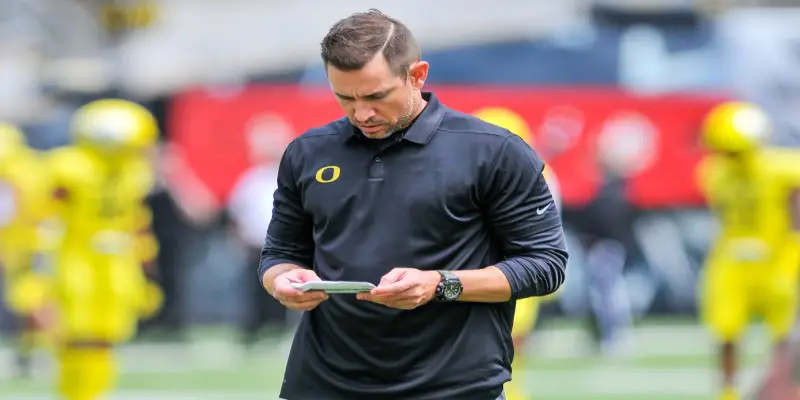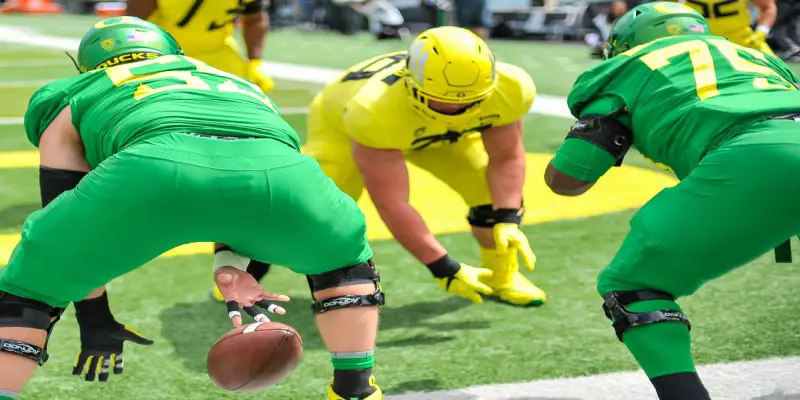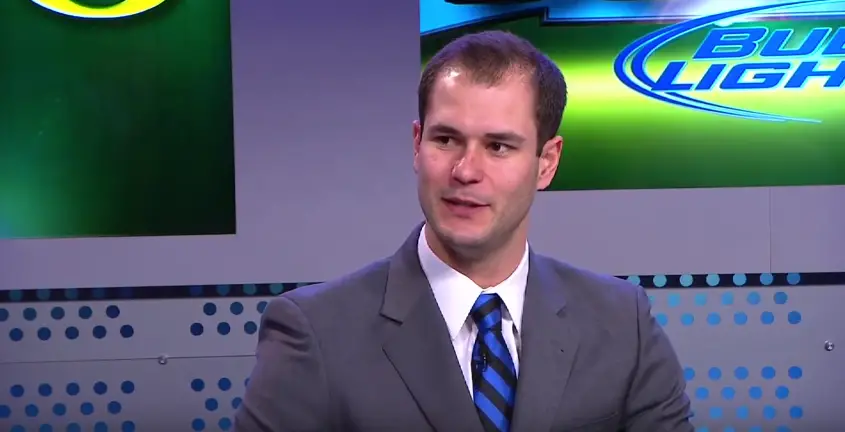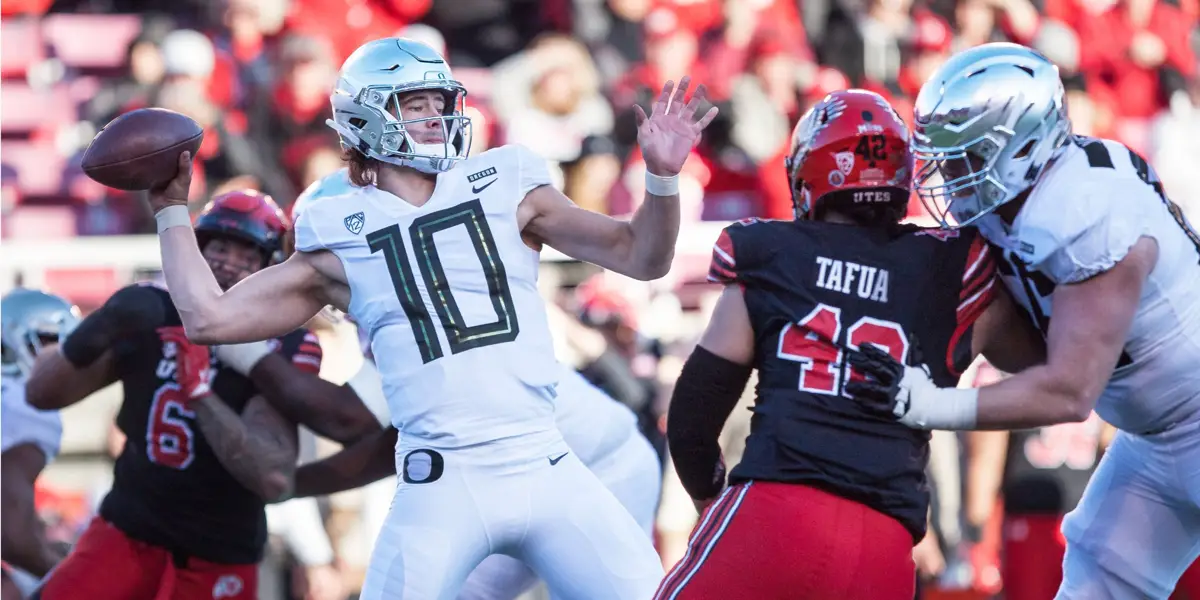The offensive coaching staff was the biggest disappointment of the Ducks’ 2018 season.
Some of you will hem and haw and throw out lame excuses like, “they need time to adjust to a new system,” or, “the wide receivers were sub-par,” or even, “a coach needs four years to get his system in place.” You get four years when you’re doing a complete rebuild (see Corvallis), not when you take over an already talented team.
The truth of the matter is, as a whole, the offense stank last year.
You want to do it wide-open style, smash mouth or a combination of both, that’s great. Yes, a new system was in place, but you must coach the players you currently have, not the ones you hope to have in three years. Not to mention, Oregon’s offense in 2018 had plenty of talent. Sure, the receiving group was mediocre at best, but the Ducks had a potential top-five NFL Draft pick at quarterback, a solid stable of running backs, and an experienced and talented offensive line.

OC Marcus Arroyo’s offense was not up to Oregon standards in 2018.
To be clear, I’m not calling for the return of the Chip Kelly offense or even challenging the overall offensive philosophy. I’m simply challenging the competence. The coaches did not put the players in a position to succeed. I’ve said it before and I’ll say it again, if you can coach a player up, you can coach a player down. The Oregon coaching staff took a Heisman Trophy Candidate and turned him into a pedestrian Power 5 quarterback.
Yes, Justin Herbert made some bad throws, reads and had some not-so-great games. But what I saw was a guy who was out of sync and unsure of himself in a way we hadn’t seen in his first two seasons. He was not being put into a position for success. You know how coaches always say they want to put players in that sacred place, “the position to succeed”? It just didn’t happen last year.
The coaches have to instill a fluidity to their play-calling to gain momentum and keep the rhythm. But in 2018, the Oregon offense was often caught in stop-and-go traffic rather than a free-flowing highway. Unfortunately, the fans were the ones suffering from road rage. That rage stemmed from poor play calling, a lacking scheme and an overall lack of coaching savvy. Yup, good ole’ know-how.
Change Seemed Imminent but Didn’t Happen
Due to the lackluster offensive showing, it seemed most likely that some sort of shake-up on offense would occur this offseason. If not the replacement of Marcus Arryo, then a high-level addition like a “Co-OC” or “Offensive Consultant.”
In fact, in February, former Indianapolis Colts and ex-Carolina Panthers offensive coordinator Rob Chudzinski may have had discussions with Oregon about coming to Eugene as a possible “special assistant to the head coach.” Obviously, it didn’t happen.

Oregon lineman warm up for the spring game.
I have faith that Mario Cristobal did not think that the offense was perfect. So, this led me to believe that Cristobal thought that the current coaching staff knew how to correct the problems on offense. But perhaps at this juncture in the offseason — after the spring game — Cristobal finally felt that at least an outside eye was needed to help maximize results. In doing so, he sort of went back to the future in bringing in a guy who played in the Kelly system and was in the same role as an analyst last season under Kelly at UCLA.
During his playing days at Oregon from 2006-10, Nate Costa was considered a heady guy who many had tagged as potential coaching material. Costa began his coaching career as a graduate assistant for the Ducks from 2013-15, served as offensive coordinator and quarterbacks coach at IMG Academy (a high school powerhouse) in 2017 and was the aforementioned analyst last season at UCLA.
(In short, “analysts” are not allowed to instruct players or recruit. They can do such things as break down film and advise the coaching staff.)
Okay, not exactly a jaw-dropping, awe-inspiring pedigree. But he doesn’t need one. He’s “just” has to have an eye for what the other coaches are missing: insight into the obvious, the not so obvious, and then some.

Nate Costa
Sure, we’d probably all feel more comfortable if the Ducks had brought in an established coach with a proven offensive track record, but at least they did something. I was not sold on the idea that the current guys running the offense had what it took to make the necessary adjustments. Perhaps Cristobal was seeing this as well.
Sometimes a young, hungry up-and-comer can possess all the necessary magic. Let’s hope so. For those who long for the return of the Kelly/Mark Helfrich acumen, you might be in luck, as this could be the missing link that brings it back.
Maybe I’m putting a little too much hope in the idea that a mere “offensive analyst” can work magic for the Ducks, but it’ll have to do, because it’s all we’ve got. We don’t know how much input he’ll have, but hopefully, he’ll have some answers, be extremely vocal with them and be sure they won’t fall on deaf ears.
When Cristobal came in, we had an understanding that Oregon’s offense would remain high octane, but with the added dimension of physicality. Unfortunately, what we got was flat, boring, uninspired offensive football.
This hire may not seem like much, but perhaps it will be the answer to our collective offensive prayers.
Darren Perkins
Spokane, Washington Top Photo by Harry Caston

Chris Brouilette, the FishDuck.com Volunteer editor for this article, is a current student at the University of Oregon from Sterling, Illinois.
Darren Perkins is a sales professional and 1997 Oregon graduate. After finishing school, he escaped the rain and moved to sunny Southern California where he studied screenwriting for two years at UCLA. Darren grew up in Eugene and in 1980, at the tender age of five, he attended his first Oregon football game. His lasting memory from that experience was an enthusiastic Don Essig announcing to the crowd: “Reggie Ogburn, completes a pass to… Reggie Ogburn.” Captivated by such a thrilling play, Darren’s been hooked on Oregon football ever since. Currently living in Spokane, Darren enjoys flaunting his yellow and green superiority complex over friends and family in Cougar country.

